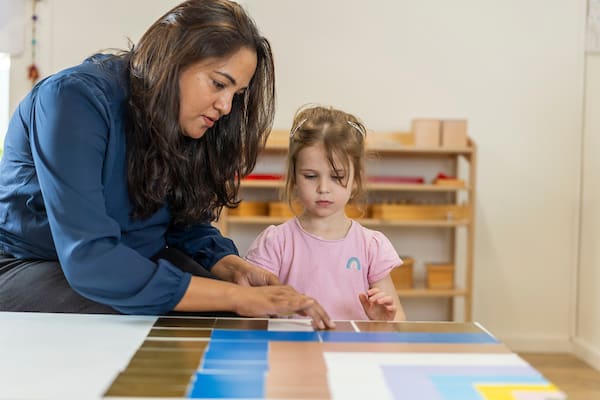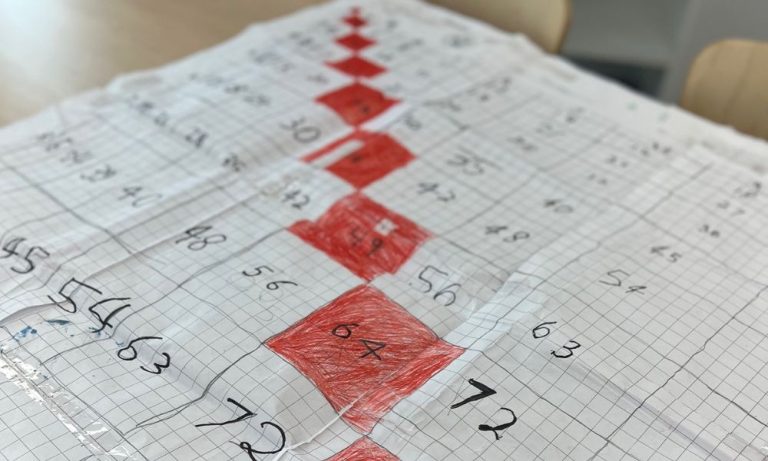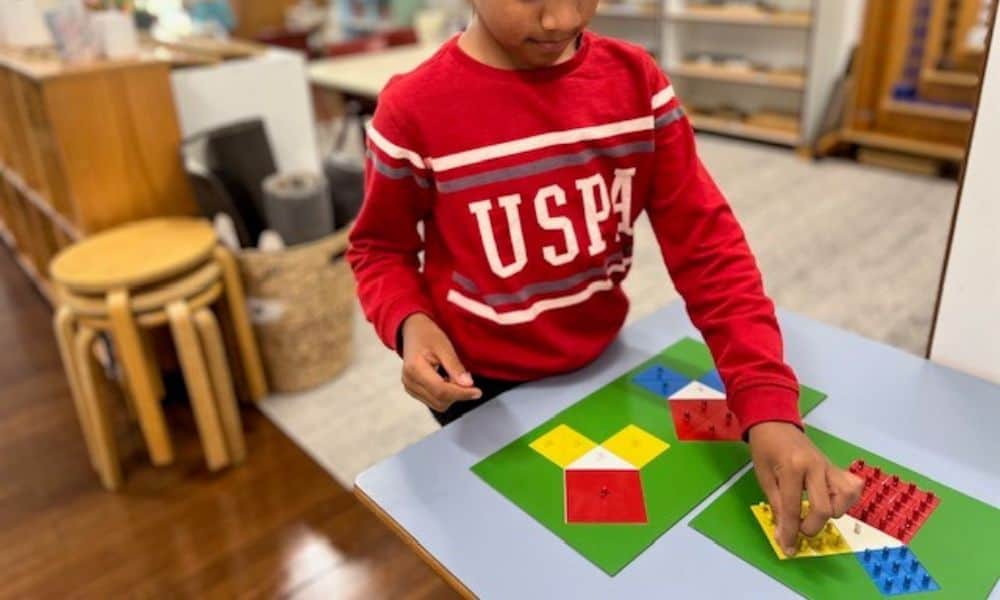Well before brain scans, Dr. Montessori discovered so much about how children’s brains function and she termed this special mental functioning, the Absorbent Mind. Her book, The Absorbent Mind, was one of the last books she compiled.
The words Dr. Montessori used to describe the child’s Absorbent Mind were chosen deliberately. The word absorbent implies “taking in” and integrating into the whole. What is absorbed becomes a part of what is doing the absorbing. Children take in their experiences and impressions which become part of the structure and content of their brains.
“Impressions do not merely enter his mind; they form it. They incarnate themselves in him. The child creates his own ‘mental muscles,’ using for this what he finds in the world about him. We have named this type of mentality, The Absorbent Mind.”
The Absorbent Mind is a superpower of children from birth to around age six.

In their presentation to the FMS parent community this week, Elma and Adelaide (3-6 year and 6-9 age educators respectively), joined forces to demonstrate the power of the Absorbent Mind and how this is built upon in 6-12 when students move into a period of development knows as the Reasoning Mind. Parents were intrigued to watch the staff showcasing their students’ mathematical learning using Montessori materials including the decanomial square and Pythagoras plates.
Elma spoke beautifully about the Absorbent Mind of the 3-6 year old – how our young children’s brains are hardwired to effortlessly absorb what is around them.
She demonstrated how children as young as 3 and 4 in the Montessori Children’s House learn and apply mathematical concepts beyond simple counting, recognising patterns, multiplication and squaring functions.

From the Absorbent Minds of 3-6 year old children, the baton passed to Adelaide, who showed how the 6-9 age group extend this knowledge, applying more complexity to their learning. She noted the continued exploration of why and how, before what in mathematics learning. Adelaide described her own experience of being handed a formula in high school and then asked to apply it – a stark contrast to the ‘big work’ done in Montessori 6-9 age classrooms. Here, curiosity and exploration drive children to discover and prove mathematical theories before applying them. This was exemplified using the Montessori Pythagoras plates in our 6-9 environments.
Attendees were wowed by the presentation of ‘follow up’ work from the 6-9 children, who created their own project and worked collaboratively to produce the work pictured, demonstrating their knowledge of multiplication, cubing and the square root of numbers.

The presentation demonstrated our intention not just to teach, but to build intelligence.
We introduce concepts to the Absorbent Mind at 3-6 years, then allow interest and application to grow as the child does.
More effective than rote learning, this provides children with deeper knowledge so they can later apply mathematical rules and concepts with confidence. Elma shared this quote from Maria Montessori to solidify this:
“The intelligence is like a house within which there are four apartments, each occupied by a certain entity. Each apartment has a door which opens out into an open place inside. We can call the entities Understanding, Reason, Memory and Interest. Each of them has a special task in the house and work together in harmony to construct intelligence. Usually a stimulus knock upon the door of Memory. Then it goes to Understanding. If Understanding accepts the stimulus, it then goes on to excite Interest and shakes him up. Interest goes with Understanding to call Reason. Thus working together they construct the Intelligence.
Memory is the one who always answers the knock at the door and takes in what is presented by the stimulus. If he is molested, he just ignores it and closes the door. Sometimes when the others see what a hard time Memory has, they too close the doors.
Education (traditionally) was only a question of memory, not of understanding or of reasoning or even of interest. Therefore, the memory always took energy from intelligence. So instead of building up the intelligence, it took away from its capital in order to keep going. If we wish to help the construction of the intelligence, we must call all the four to work together.
We must not leave the task of building only to the memory who like a servant can do nothing but manual work. The rest of the work must be shared by the other three – interest which pricks the intelligence and keeps it alive and understanding which calls forth reason. If memory does all the work, it will build only a mechanical intelligence. Such an intelligence would be like a person dressed in royal clothes who tries to make other people believe he is a king when he is really not one.”
Creative Development in the Child , The Montessori Approach – Volume 2
During the years of the Absorbent Mind, our children are open to learning and absorbing ideas that become part of their nature. It is our job to grow this knowledge and provide space and opportunity for them to develop intelligence as they get older.
Our teachers, programs, the Montessori materials and the Prepared Environments, work together to provide engaging, interesting and intelligence-building activities from our youngest years to our primary years and beyond.
If you would like to learn more about our school and our programs, please schedule a tour. We love to share how we support children as they are discovering what is possible!



